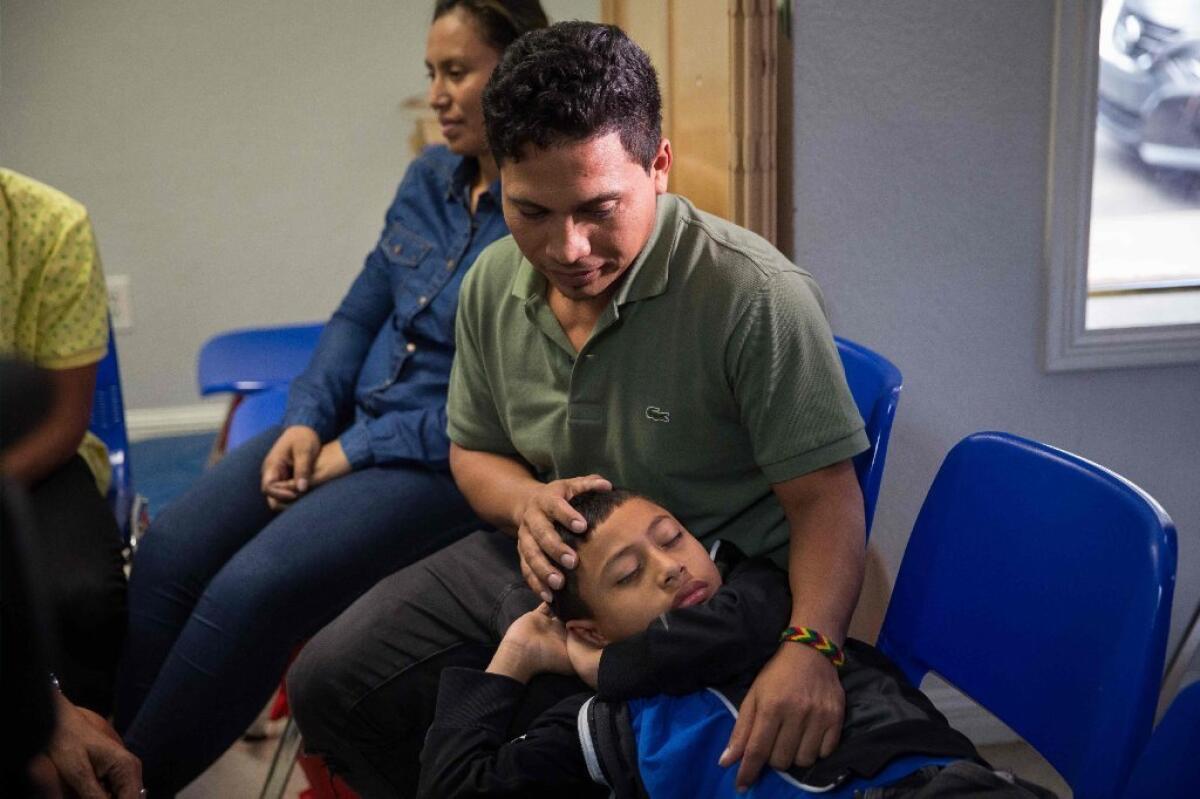Trump administration has separated 900 migrant children despite order to stop practice

The ACLU argues the government is abusing its discretion as to what makes a parent unfit or a danger
- Share via
SAN DIEGO — The Trump administration has separated 911 migrant children from their parents at the border since a San Diego federal judge last summer ordered an end to the systemic practice, the American Civil Liberties Union reported to the court Tuesday.
The continuing separations are largely blamed on parental criminal history — an exception that U.S. District Judge Dana Sabraw has carved out in the ongoing litigation.
But lawyers with the ACLU argue that the government is abusing its discretion as to what makes a parent unfit or a danger. They say law enforcement officers are continuing to separate families based on past minor criminal offenses, health issues or unsubstantiated doubts as to parentage.
One father in detention was separated from his ill baby daughter after he decided to let her continue sleeping in his arms with a wet diaper, according to a sworn affidavit by an attorney. Other parents faced separation for such things as “malicious destruction of property” valued at $5, DUIs, shoplifting or fraud, according to government data given to the ACLU.
More than 20% of the new separations — 185 children — are younger than 5 years old.
“This issue has reached a critical juncture,” ACLU attorney Lee Gelernt wrote in his motion to the court. “Hundreds of children, some literally just babies, are being irreparably damaged because their parent may have committed a minor offense in the past, even a traffic offense.”
Family separations became routine in May 2018 — beginning even earlier in some regions — under the administration’s zero-tolerance policy to criminally prosecute all illegal entry cases.
But as public furor over the practice grew, President Trump called for an end to the separations in June 2018.
About a week later — on June 26, 2018 — the judge in San Diego issued an injunction against separations. The court order still allows families to be separated if the parent is charged with a criminal offense — such as illegal entry or otherwise — but orders immediate reunification upon release from criminal custody and for the duration of the family’s civil immigration case.
The injunction included an order to reunify 2,800 families that had been separated under the policy, including about 400 parents who had been deported while their children remained in U.S. custody.
The debate over which parents would be allowed to reunite began early on, as government attorneys expressed concern that some parents had serious criminal backgrounds, carried communicable diseases or weren’t even parents but human traffickers.
Sabraw agreed that parents with criminal backgrounds would be excluded from the class but also urged the government to use its discretion to reunite as many children as possible “absent a determination that the parent is unfit or presents a danger to the child.” The judge left open the possibility that individual cases could be argued for reunification.
In testimony to the House Oversight Committee this month, acting Homeland Security Secretary Kevin McAleenan characterized continuing family separations as rare among the 400,000 family groups that had crossed the border since October. He emphasized that the decisions are made by supervisors according to policy and court order.
“This is in the interest of the child,” he testified.
The ACLU argues the government is “systematically separating children from fit parents” in violation of a constitutional standard.
The ACLU has been receiving monthly updates from the government on new separations over the past year. Of the 911, 678 were based on criminal conduct, 71 on gang affiliation, 20 for allegations of unfitness or safety concerns, 46 for unverified familial relationship and 24 for parental illness.
The government’s explanations don’t get more specific than that in many cases, although the ACLU has been rounding out the record with sworn declarations from the network of attorneys who have been representing separated families.
One father was separated with his three young daughters because he has HIV, according to one attorney. Another mother who broke her leg at the border did not immediately have her 5-year-old child returned once she was released. A lawyer had to get involved, and the child was released after 79 days of being apart.
Other attorneys gave examples of incidents in which Customs and Border Protection officers alleged parents were lying about their family relationship, only to be proven right in DNA tests much later.
“A three-year-old girl was separated from her father due to CBP’s allegation that he was not a parent. Although the father’s name does not appear on the child’s birth certificate, he presented other documentation showing parentage, and requested a DNA test. DHS ignored his request and separated the family. After counsel intervened, the family took a DNA test, which confirmed paternity,” one lawyer’s declaration reads. The daughter was sexually abused while in government custody, the lawyer alleges.
Sabraw has asked the ACLU and government attorneys to try to settle the issue of separations in closed-door negotiations, but Gelernt reports that the meetings have gone nowhere.
He is asking for the court to step in and has requested a hearing as soon as the court can schedule one.
The ACLU has already lost one legal battle on this front.
Last year the ACLU asked Sabraw to order the reunifications of two parents with their young children after the government had deemed them to have “significant” criminal histories. One mother was accused in an outstanding but unsubstantiated warrant in El Salvador of being a gang member, while a father had a misdemeanor conviction from eight years ago for swinging a machete at his wife.
In the end, Sabraw did not make a ruling as to whether either parent was unfit or a danger but said the government appeared to have “vetted the parents in good faith” and didn’t take that discretion away.
Davis writes for the San Diego Union-Tribune.
More to Read
Sign up for Essential California
The most important California stories and recommendations in your inbox every morning.
You may occasionally receive promotional content from the Los Angeles Times.










